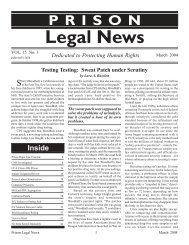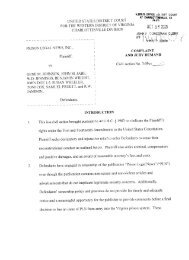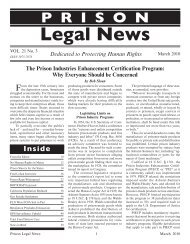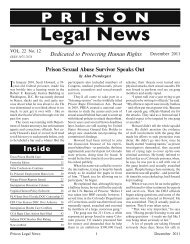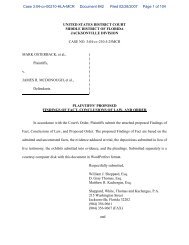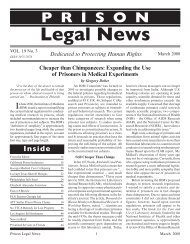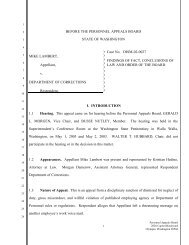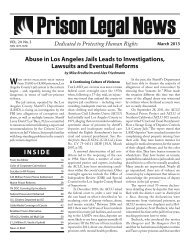From the Editor - Prison Legal News
From the Editor - Prison Legal News
From the Editor - Prison Legal News
Create successful ePaper yourself
Turn your PDF publications into a flip-book with our unique Google optimized e-Paper software.
Flurry of Escapes Emphasizes <strong>Prison</strong>ers’ Desperation<br />
Last September produced a bumper<br />
crop of prison and jail escapes<br />
around <strong>the</strong> country, including a desperate<br />
escape by two Texas prisoners that resulted<br />
in <strong>the</strong> death of a guard, a car jacking and<br />
two shootouts. Plus a dead horse.<br />
Jerry Duane Martin, 37, and John<br />
Ray Falk, Jr., 40, were just two Texas<br />
prisoners working oppressive field labor<br />
jobs at <strong>the</strong> Wynne Unit, a Texas Dept.<br />
of Criminal Justice (TDCJ) facility, until<br />
<strong>the</strong>y escaped and killed a guard in <strong>the</strong><br />
process on September 24, 2007. Field<br />
labor is <strong>the</strong> TDCJ’s equivalent of a chain<br />
gang. The “hoe squads” work outside <strong>the</strong><br />
prison fence in agricultural fields, often<br />
literally with an eight-pound hoe in hand.<br />
They are supervised by armed guards on<br />
horseback.<br />
The work is hard. Verbal and psychological<br />
abuse by <strong>the</strong> guards is plentiful. It<br />
is essentially a disciplinary detail without<br />
<strong>the</strong> benefit of any disciplinary process.<br />
<strong>Prison</strong>ers who have disciplinary problems<br />
are put to work in <strong>the</strong> field, as are new<br />
prisoners – who must “prove <strong>the</strong>mselves<br />
worthy” of a non-paying job in industry<br />
or support services – and prisoners <strong>the</strong><br />
administration simply doesn’t like, such<br />
as “writ writers.” In Martin’s case, he was<br />
likely on a hoe squad due to allegations<br />
that he had a sexual relationship with a<br />
nurse at <strong>the</strong> Polunsky Unit in Livingston,<br />
Texas. That infraction cost him 30 days of<br />
good time and resulted in his transfer to<br />
<strong>the</strong> Wynne Unit.<br />
At about 10:30 a.m., Martin and<br />
Falk were deployed in <strong>the</strong> fields outside<br />
<strong>the</strong> 2,600-bed prison in Huntsville, along<br />
with 74 o<strong>the</strong>r prisoners monitored by six<br />
guards on horseback. Five of <strong>the</strong> guards<br />
were directly supervising <strong>the</strong> hoe squads<br />
and were armed with pistols, while sevenyear<br />
TDCJ veteran Susan Canfield, 59,<br />
was a “high rider,” a guard who carried<br />
a rifle and was charged with preventing<br />
any escapes.<br />
Martin approached <strong>the</strong> guard who<br />
was supervising his squad and asked<br />
him to hold his watch while he worked.<br />
Violating procedures which require armed<br />
guards to maintain a 30-foot separation<br />
from prisoners, <strong>the</strong> guard allowed Martin<br />
to approach to hand over <strong>the</strong> watch. Instead,<br />
Martin snatched <strong>the</strong> guard from his<br />
horse and wrestled his .357 magnum pistol<br />
away from him, <strong>the</strong>n tossed it to Falk.<br />
by Matt Clarke<br />
The pair retreated across a field and<br />
stole a flatbed truck that was parked at<br />
a nearby repair facility with <strong>the</strong> keys in<br />
<strong>the</strong> ignition. They fired shots at Canfield,<br />
who returned fire along with o<strong>the</strong>r guards.<br />
Canfield maneuvered in front of <strong>the</strong> truck,<br />
which struck her horse – injuring it and<br />
causing Canfield to fall and receive an<br />
immediately fatal injury. Martin and Falk<br />
fled <strong>the</strong> immediate area. The horse, which<br />
survived <strong>the</strong> collision, was euthanized<br />
after it was discovered that it had also<br />
been shot.<br />
The two escapees didn’t get far. They<br />
ditched <strong>the</strong> truck at a defunct fast food<br />
joint about a mile south on I-45 at <strong>the</strong><br />
Texas 30 interchange. At a nearby bank<br />
drive-through <strong>the</strong>y carjacked a pickup<br />
truck and kidnapped <strong>the</strong> woman driving<br />
it. The Huntsville police, in close pursuit,<br />
shot out <strong>the</strong> pickup’s tires and forced <strong>the</strong><br />
pair to flee on foot.<br />
Falk was caught without fur<strong>the</strong>r incident<br />
soon <strong>the</strong>reafter. Martin was tracked<br />
by dogs and discovered hiding in a tree less<br />
than three hours later; after brief gunfire<br />
he was recaptured.<br />
Falk had been serving a life sentence<br />
since 1986 for killing a Matagorda County<br />
lawyer after robbing him of $143. Martin<br />
was serving a 50-year sentence following<br />
a high-speed chase during which he used<br />
a .38-caliber revolver to fire on county<br />
deputies and state troopers who had<br />
responded to a domestic disturbance<br />
complaint. The pair now face dozens of<br />
felony charges, including “unauthorized<br />
use of a motor vehicle, escape, cruelty to<br />
animals, [and] multiple attempted capital<br />
murders because <strong>the</strong>re were dozens of<br />
people that were shot at,” said Walker<br />
County District Attorney David Weeks.<br />
“When it all comes down, both will be<br />
charged with capital murder, but it will<br />
take some time to sort through it.”<br />
Asked by <strong>the</strong> news media why he did<br />
it, Martin put it this way: He had no hope.<br />
“I don’t have nothing left to lose,” he said.<br />
Indeed, most Texas prisoners can understand<br />
that sentiment, as <strong>the</strong>y are faced<br />
with an arbitrary and capricious state<br />
parole system that saps <strong>the</strong> hope from<br />
prisoners as <strong>the</strong>y receive denial after denial<br />
for unchanging historic factors such<br />
as <strong>the</strong> nature of <strong>the</strong>ir offense and prior<br />
criminal record, with no inkling of when,<br />
or if, <strong>the</strong>y will ever be released.<br />
The TDCJ has one of <strong>the</strong> most secure<br />
prison systems in <strong>the</strong> nation, having experienced<br />
only two escapes each in 2005 and<br />
2006. The total number of escapes from<br />
2001 to 2006 was only 14, and many of<br />
those were “walk aways” from outside<br />
trusty camps.<br />
“<strong>Prison</strong>s are stronger and better<br />
designed, with lots of bells and whistles,<br />
and <strong>the</strong>re is more security,” said Terry<br />
Perez, a Texas criminal justice consultant.<br />
“And <strong>the</strong>re is no honor among criminals<br />
anymore. You hatch a plot today and<br />
somebody is going to snitch you off.”<br />
It makes one wonder all <strong>the</strong> more why<br />
TDCJ insists on taking any prisoners –<br />
especially ones with disciplinary problems<br />
and long sentences – outside secure prison<br />
fences, even if <strong>the</strong>y are under armed supervision.<br />
This is especially true in light of<br />
<strong>the</strong> State Comptroller’s recommendation a<br />
decade ago that <strong>the</strong> TDCJ eliminate field<br />
labor, because <strong>the</strong> work being done by<br />
<strong>the</strong> hoe squads could be completed more<br />
efficiently by farm equipment already<br />
owned by <strong>the</strong> TDCJ. Fur<strong>the</strong>r, <strong>the</strong> cut in<br />
personnel would save TDCJ millions of<br />
dollars a year.<br />
So why does do Texas prison officials<br />
insist on perpetuating <strong>the</strong> field labor<br />
system? It is a legacy of <strong>the</strong> plantation<br />
slavery mentality of <strong>the</strong> Old South. <strong>Prison</strong>ers<br />
in <strong>the</strong> hoe squads call <strong>the</strong> guards<br />
“Boss,” and have to receive permission<br />
to perform even <strong>the</strong> most basic of bodily<br />
functions like urinating or drinking water<br />
– reminiscent of <strong>the</strong> 1967 movie classic<br />
Cool Hand Luke. As frequently reported<br />
by PLN, prison slave labor is an economically<br />
inefficient taxpayer boondoggle that<br />
serves <strong>the</strong> ideological needs of politicians<br />
in showing how “tough” <strong>the</strong>y are on prisoners.<br />
Alas, it is not confined to <strong>the</strong> former<br />
confederacy.<br />
In <strong>the</strong> tradition of sou<strong>the</strong>rn slavery<br />
<strong>the</strong>re were house slaves and field slaves,<br />
with <strong>the</strong> house slaves having <strong>the</strong> more<br />
prestigious status. TDCJ perpetuates this<br />
tradition by degrading its prisoner field<br />
workers. The field labor crews are also<br />
used to intimidate prisoners in <strong>the</strong> general<br />
population. Incur <strong>the</strong> displeasure of <strong>the</strong><br />
administration, or even a single guard, and<br />
Texas prisoners can expect to end up on a<br />
hoe squad without any due process protections,<br />
since a transfer to field labor is an<br />
“administrative,” not disciplinary, act.<br />
April 2008<br />
16<br />
<strong>Prison</strong> <strong>Legal</strong> <strong>News</strong>



